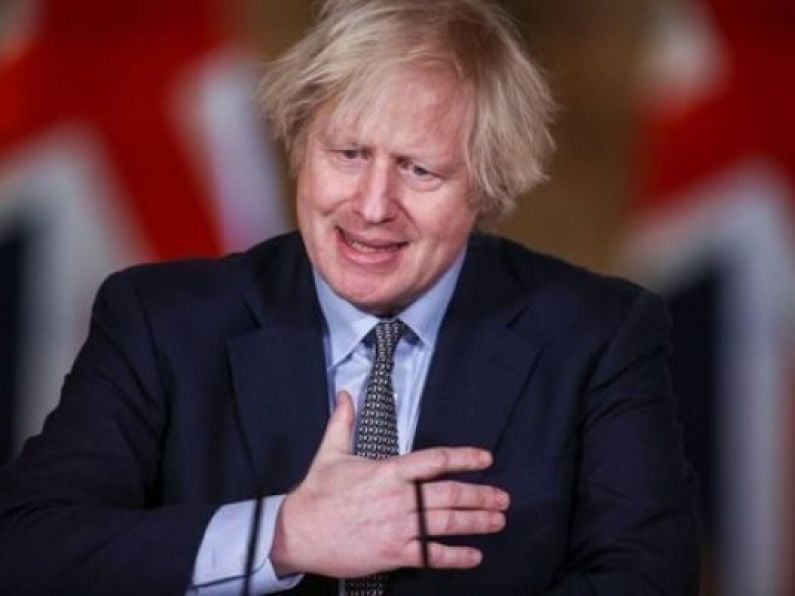The UK is planning to offer 3.7 million Covid-19 jabs to the Republic, as prime minister Boris Johnson is urged to donate vaccines or risk hoarding supplies.
The offer is partly designed to aid in lifting lockdown restrictions in Northern Ireland.
The Sunday Times reports that a UK cabinet minister said it would be a “poke in the eye” for Brussels amid a row over vaccine supply in the European Union.
This would be the first time the UK has exported vaccines to the EU.
Boris Johnson is also facing calls to being donating vaccines to poorer nations.
Sharing doses
Charities urged Mr Johnson to take “accelerated action” and “swiftly clarify” how doses will be shared.
The group Wellcome, led by Sage scientist Sir Jeremy Farrar, and Save the Children UK were two of the groups who made the demand in a letter to the prime minister.
It says the UK is “one of the world’s highest per-capita buyers” of vaccines and is on track to have more than 100 million surplus doses.
“There is therefore the high risk that the UK will be hoarding limited supply whilst health workers and the most vulnerable in low and middle-income countries do not have access,” the letter reads.
“The UK will be sitting on enough surplus vaccine doses to vaccinate the world’s frontline health workers twice over.”
The letter asks Britain to start donating vaccines through the Covax initiative, a plan that is aiding in the donation of vaccines to for low and middle-income countries.
The government responded by saying it will share “the majority of any future surplus” vaccines with the Covax pool “when these are available”.
The groups also point out that vaccine nationalism nd the unequal distribution of jabs could cost the UK £106 billion (€123 billion).
The letter was also signed by anti-poverty campaigns One and Global Citizen, Results UK charity and the Pandemic Action Network.
Sir Jeremy said the UK will have contractual access to at least 100 million surplus doses once the entire population is vaccinated, adding that these “won't be of use to the UK”.
“Now is the time to think beyond our borders. The world won’t be safe while any single country is still fighting the virus,” he said.
“If left to spread, it risks mutating to an extent where our vaccines and treatments no longer work. This goes beyond ethics — it’s a scientific and economic imperative. Science has given us the exit strategy. We must use it properly.”
Global access
A UK government spokesperson said: “The UK has played a leading role in championing global access to coronavirus vaccines. This includes contributing £548 million, as one of the largest donors, to the Covax Advance Market Commitment, which has already helped 20 lower-middle countries to receive doses.
“The prime minister has confirmed the UK will share the majority of any future surplus coronavirus vaccines from our supply with the Covax pool, when these are available. No one is safe until we are all safe.”
During a discussion at the Conservatives’ virtual spring forum on Saturday, prime minister Boris Johnson said that a “third wave” is being witnessed in parts of Europe and “bitter experience” has taught him that this could hit the UK “three weeks later”.
But he added: “There’s lots of promising evidence that a lot of people who could be vulnerable are now protected against death and serious disease, that’s my hope, my hunch.”
Mr Johnson remained optimistic that his roadmap to easing England’s restrictions can continue, saying there is a “good chance” of allowing non-essential retail reopening on April 12th, when hairdressers are also earmarked to reopen.
Data up to Friday showed that 29,727,435 people in the UK have received a first jab, a rise of 411,305 on the previous day.
The government said a further 58 people had died within 28 days of a positive test for Covid-19 as of Saturday, bringing the UK total to 126,573.
In Wales, lockdown restrictions were eased when the “stay local” requirement was dropped on Saturday and people were allowed to stay in self-contained holiday accommodation.
A relaxing of England’s lockdown will take place on Monday when the “stay home” order ends, and groups of up to six people, or two households, are able to meet outside.






